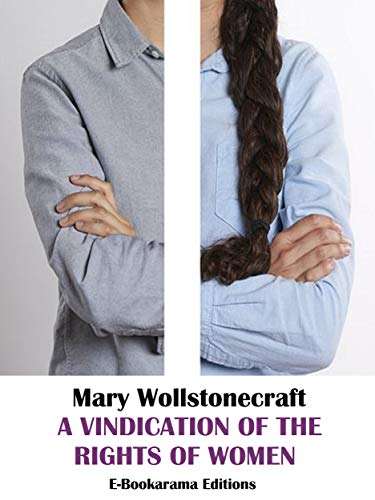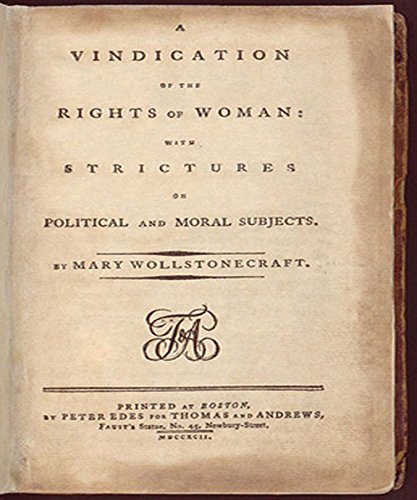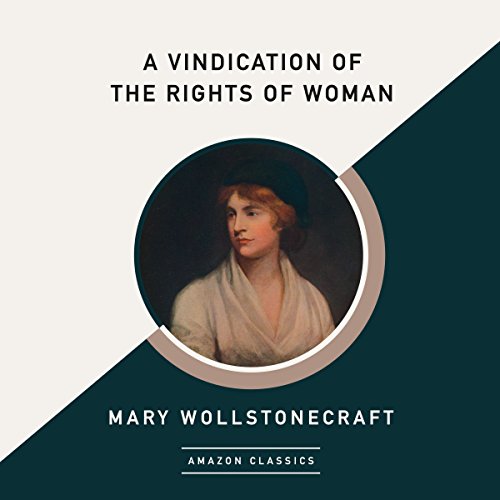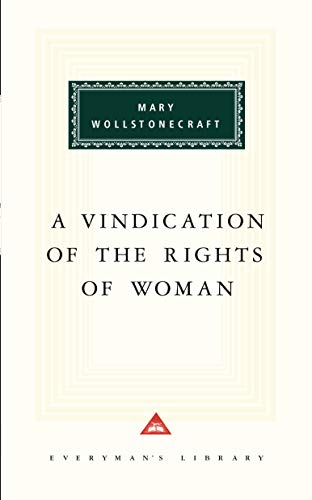-
A Vindication of the Rights of Women
Mary Wollstonecraft
eBook (E-BOOKARAMA, April 5, 2019)"A Vindication of the Rights of Women" is a book-length feminist essay by British writer Mary Wollstonecraft, published in 1792. The essay called for female equality, particularly in the area of education. Wollstonecraft dismissed the cultivation of traditional female virtues of submission and service and argued that women could not be good mothers, good wives and good household managers if they were not well-educated. She claimed that women were expected to spend too much time on maintaining their delicate appearance and gentle demeanor, sacrificing intelligence for beauty and becoming flower-like playthings for men.The book is divided into thirteen chapters, in which Wollstonecraft addressed topics such as the importance of educating women equally, treating women with dignity and providing women with the proper training to be good wives and mothers and intelligent companions for their husbands:
-
A Vindication of the Rights of woman
Mary Wollstonecraft
eBook (, Feb. 6, 2017)A Vindication of the Rights of Womanby Mary WollstonecraftWriting in an age when the call for the rights of man had brought revolution to America and France, Mary Wollstonecraft produced her own declaration of female independence in 1792. Passionate and forthright, A Vindication of the Rights of Woman attacked the prevailing view of docile, decorative femininity, and instead laid out the principles of emancipation: an equal education for girls and boys, an end to prejudice, and for women to become defined by their profession, not their partner. Mary Wollstonecraft’s work was received with a mixture of admiration and outrage – Walpole called her ‘a hyena in petticoats’ – yet it established her as the mother of modern feminism.
-
Vindication of the Rights of Woman
Mary Wollstonecraft
eBook (Modern Library, March 24, 2011)This book was converted from its physical edition to the digital format by a community of volunteers. You may find it for free on the web. Purchase of the Kindle edition includes wireless delivery.
-
Vindication of the Rights of Woman
Mary Wollstonecraft
eBook (, March 24, 2011)This book was converted from its physical edition to the digital format by a community of volunteers. You may find it for free on the web. Purchase of the Kindle edition includes wireless delivery.
-
Vindication of the Rights of Woman
Mary Wollstonecraft
eBook (, March 24, 2011)This book was converted from its physical edition to the digital format by a community of volunteers. You may find it for free on the web. Purchase of the Kindle edition includes wireless delivery.
-
A Vindication of the Rights of Woman
Mary Wollstonecraft, Jan Cramer, Brilliance Audio
Audiobook (Brilliance Audio, March 27, 2018)First published in 1792, A Vindication of the Rights of Woman tackles many of the punitive patriarchal attitudes that dominated 18th-century society. With warmth and passion, Mary Wollstonecraft urges women to prioritize reason over emotion - a necessary step in building the strength of character required to break free from male notions of female fragility and foolishness. Wollstonecraft bases much of her argument in the case for women's education. Without it, women are merely men's "slaves" and "playthings" - not the intelligent, rational companions of a just and equal society. As stirring as when it debuted, Wollstonecraft's signature work remains an essential text in the feminist literary canon. AmazonClassics brings you timeless works from iconic authors. Ideal for anyone who wants to listen to a great work for the first time or revisit an old favorite, these new editions open the door to the stories and ideas that have shaped our world.
-
A Vindication of the Rights of Woman
Mary Wollstonecraft
Paperback (Dover Publications, July 3, 1996)In an era of revolutions demanding greater liberties for mankind, Mary Wollstonecraft (1759–1797) was an ardent feminist who spoke eloquently for countless women of her time.Having witnessed firsthand the devastating results of male improvidence, she assumed an independent role early in life, educating herself and eventually earning a living as a governess, teacher and writer. She was also an esteemed member of the radical intellectual circle that included William Godwin (father of her daughter, novelist Mary Godwin Shelley, and later her husband), Thomas Paine, William Blake, Henry Fuseli and others.First published in 1792, A Vindication of the Rights of Woman created a scandal in its day, largely, perhaps, because of the unconventional lifestyle of its creator. Today, it is considered the first great manifesto of women’s rights, arguing passionately for the education of women: "Tyrants and sensualists are in the right when they endeavor to keep women in the dark, because the former want only slaves, and the later a plaything."No narrow-minded zealot, Wollstonecraft balanced passionate advocacy with a sympathetic warmth — a characteristic that helped her ideas achieve widespread influence. Anyone interested in the history of the women’s rights movement will welcome this inexpensive edition of one of the landmark documents in the struggle for human dignity, freedom and equality.
-
A Vindication of the Rights of Woman
Mary Wollstonecraft
Paperback (CreateSpace Independent Publishing Platform, Nov. 24, 2016)A Vindication of the Rights of Woman, Mary Wollstonecraft's passionate work supporting women's rights, is considered to be among the very first examples of feminist philosophy. When it appeared in 1792, Wollstonecraft's treatise sets out a range of what were at the time radical beliefs; she thought all women should have a formal education, so that they may raise their children to be keener in mind as well as prove able conversationalists with their husbands. Wollestonecraft by no means unreservedly supports marriage: she states that women should not be thought of merely as items to be bandied about and wed, but as human beings capable of great intellect. Wollstonecraft also lambastes the prevailing social picture of women; that they have a number of fixed, narrow and often domestic duties. She also singles out how women are expected to behave, criticizing in particular the notion that the highest aspiration of a woman is to be a sentimental heroine in a popular romance novel. Living in a time when women's rights was in its infancy, Mary Wollstonecraft suffered opposition and denigration for publishing this and other works which supported the advancement of women's rights. Although this book received a positive reception in intellectual communities who at the time debated the rights of women, it would ultimately be rejected by the society of the era, with Wollstonecraft herself becoming something of a posthumous pariah in literary circles. Despite this, her views left a mark: future generations of feminist thinkers such as the Suffragette movement and members of the first, second and third waves of feminist philosophy cited Wollstonecraft as an inspiration and influence. This book remains a frequent object of study in philosophy and other academic courses to this day.
-
A Vindication of the Rights of Woman
Mary Wollstonecraft
Paperback (Independently published, Jan. 19, 2020)A Vindication of the Rights of Woman: with Strictures on Political and Moral Subjects, written by the 18th-century British proto-feminist Mary Wollstonecraft, is one of the earliest works of feminist philosophy.
-
Mary Wollstonecraft - A Vindication of the Rights of Woman
Mary Wollstonecraft
Paperback (CreateSpace Independent Publishing Platform, Dec. 14, 2016)Writing in an age when the call for the rights of man had brought revolution to America and France, Mary Wollstonecraft produced her own declaration of female independence in 1792. Passionate and forthright, A Vindication of the Rights of Woman attacked the prevailing view of docile, decorative femininity, and instead laid out the principles of emancipation: an equal education for girls and boys, an end to prejudice, and for women to become defined by their profession, not their partner. Mary Wollstonecraft's work was received with a mixture of admiration and outrage - Walpole called her 'a hyena in petticoats' - yet it established her as the mother of modern feminism.
-
A Vindication of the Rights of Woman
Mary Wollstonecraft, Miriam Brody
Paperback (Penguin Classics, Sept. 28, 2004)Writing in an age when the call for the rights of man had brought revolution to America and France, Mary Wollstonecraft produced her own declaration of female independence in 1792. Passionate and forthright, A Vindication of the Rights of Woman attacked the prevailing view of docile, decorative femininity, and instead laid out the principles of emancipation: an equal education for girls and boys, an end to prejudice, and for women to become defined by their profession, not their partner. Mary Wollstonecraft's work was received with a mixture of admiration and outrage - Walpole called her 'a hyena in petticoats' - yet it established her as the mother of modern feminism.For more than seventy years, Penguin has been the leading publisher of classic literature in the English-speaking world. With more than 1,700 titles, Penguin Classics represents a global bookshelf of the best works throughout history and across genres and disciplines. Readers trust the series to provide authoritative texts enhanced by introductions and notes by distinguished scholars and contemporary authors, as well as up-to-date translations by award-winning translators.
-
A Vindication of the Rights of Woman
Mary Wollstonecraft, Barbara Taylor
Hardcover (Everyman's Library, June 2, 1992)(Book Jacket Status: Not Jacketed)The first great manifesto of women’s rights, published in 1792 and an immediate best seller, made its author the toast of radical circles and the target of reactionary ones. Writing just after the French and American revolutions, Mary Wollstonecraft firmly established the demand for women’s emancipation in the context of the ever-widening urge for human rights and individual freedom that surrounded those two great upheavals. She thereby opened the richest, most productive vein in feminist thought, and her success can be judged by the fact that her once radical polemic, through the efforts of the innumerable writers and activities she influenced, has become the accepted wisdom of the modern era. Challenging the prevailing culture that trained women to be nothing more than docile, decorative wives and mothers, Wollstonecraft was an ardent advocate of equal education and the full development of women’s rational capacities. Having supported herself independently as a governess and teacher before finding success as a writer, and having conducted unconventional relationships with men, Wollstonecraft faced severe criticism both for her life choices and for her ideas. In A Vindication of the Rights of Woman she dared to ask a question whose urgency is undiminished in our time: how can women be both female and free?